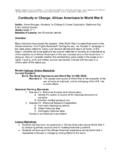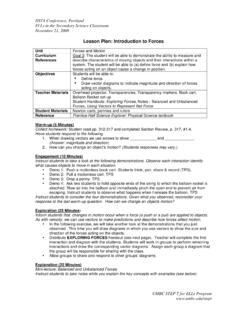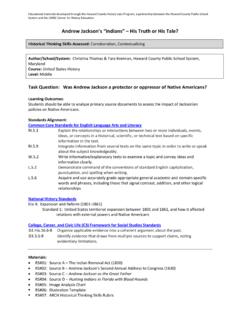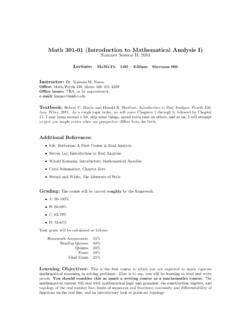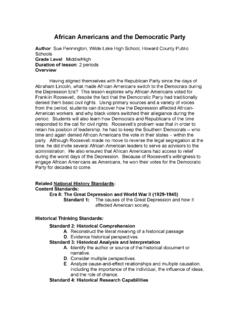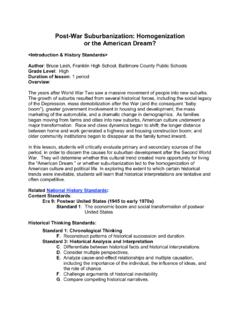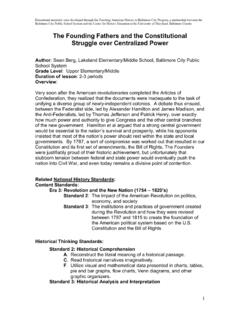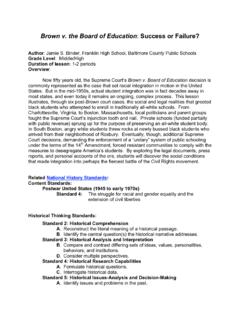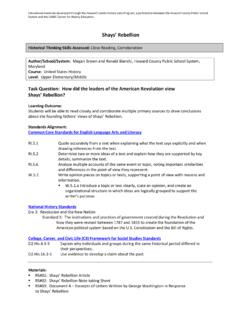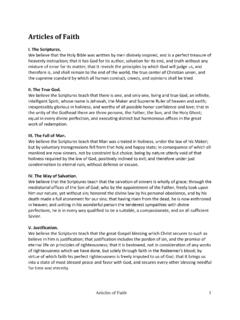Transcription of Who F ired the “shot heard ‘round the world”?
1 Educational materials were developed through the Teaching American History in Anne Arundel County Program, a partnership between the Anne Arundel County Public School System and the Center for History Education at the University of Maryland, Baltimore County. Who Fired the shot heard round the world ? Author: Elaine M. Price, Odenton Elementary, Anne Arundel County Public Schools Grade Level: Middle Duration: Two class periods Overview: On April 19, 1775, the Battle of Lexington and Concord marked the first military engagement of the American Revolution. Colonists had gathered in the early morning on Lexington Green to prevent approaching British troops from destroying guns and ammunition that were stored in nearby Concord. The gathered faction of colonists was ordered by the British to disperse when the shot heard round the world was fired and the American Revolution began. Ralph Waldo Emerson wrote that immortal line in his 1837 Concord Hymn, but what is perhaps most intriguing about that fateful shot is that no one knows for sure who fired it.
2 Eyewitness accounts with differing opinions about the opening shot abound. In this lesson, students will asked to make their own decision as to who they think fired the first shot by reading and analyzing primary source documents. They will be asked to defend their opinion by citing primary source evidence. Content Standards: Era 3: Revolution and the New Nation (1754 1820s) Standard 1:The causes of the American Revolution, the ideas and interests involved in forging the revolutionary movement, and the reasons for the American victory. Standard 2:The impact of the American Revolution on politics, economy, and society. Historical Thinking Standards: Standard 3: Historical Analysis and Interpretation multiple perspectives. F. Compare competing historical narratives. The student will use primary sources to analyze the events of April 19, 1775 in Lexington, Massachusetts. Ralph Waldo Emerson in his poemConcord Hymn would name the first shot returned by the Minutemen at the bridge in Concord the shot heard round the world , Many have debated whether it was the British or the colonists who fired that fateful opening round .
3 We may neverEducational materials were developed through the Teaching American History in Anne Arundel County Program, a partnership between the Anne Arundel County Public School System and the Center for History Education at the University of Maryland, Baltimore County. really know but not because of a lack of evidence. Eye witness accounts abound. The question is which stories are true. Colonists assembled on Lexington Green in the early morning hours of April 19 th , 1775, to try to prevent British soldiers from capturing a supply of guns and ammunition stored in Concord. Accounts of the number of colonists and British soldiers that participated in the skirmish vary, but approximately 70 Massachusetts militia members, known as Minutemen, mustered on Lexington green to halt the eastward progress of as many as 1,000 British soldiers and officers. A shot fired by an unknown participant in the skirmish instigated the first battle of the American Revolutionary War.
4 Below are some of the contemporary accounts. British and Militia accounts of the event differ greatly. Lieutenant John Barker, a British officer at Lexington, wrote in his diary, at 5 o clock we arrived there, and saw a number of people, I believe between 200 and 300, formed in a common in the middle of town we still continued advancing, keeping prepared against an attack through without intending to attack them but on our coming near them they fired on us two shots, upon which our men without any orders, rushed upon them, fired and put them to flight several of them were killed, we could not tell how many, because they were behind walls and into the woods. 1 Another account from Lieutenant Edward Thoroton Gould, an officer in his majesty s own Regiment of Foot states that, under Orders of General Gage, I embarked with the Light infantry and Grenadiers of the Line, commanded by Colonel Smith, and landed on the Marshes of Cambridge, from whence we proceeded to Lexington On our arrival at that place, we saw a Body of provincial Troops armed, to the Number of about sixty or seventy Men on our Approach, they dispersed, and soon after firing began but which party fired first, I cannot exactly say, as our Troops rush d on shouting, and huzzaing, previous to the firing, which wasEducational materials were developed through the Teaching American History in Anne Arundel County Program, a partnership between the Anne Arundel County Public School System and the Center for History Education at the University of Maryland, Baltimore County.
5 Continued by our Troops, so long as any of the provincials were to be seen. 2 Even these two official accounts given by British officers differ about the number of colonial militia members on Lexington Green and which side fired first. It is, however, apparent from Lieutenant Gould s account that it was very loud on the Green, due to the shouting of the British troops, which may have lead to the confusion and differing accounts. Colonial militia accounts of the action on Lexington Green paint a different picture on the events in the early morning hours of April 19 th . John Robins, a member of the Lexington Militia, was in the front ranks of the Minutemen as the British approached. There suddenly appear d a Number of the Kings Troops, about a Thousand, as I thought, at the distance of about 60 or 70 yards from us Huzzaing, and on a quick pace towards us, with three Officers in their front on Horse Back, and on full Gallop towards us, the foremost of which cryed, throw down your Arms ye Villains, ye Rebels!
6 Upon which said Company Dispersing, the foremost of the three Officers order d their Men, saying fire, by God, fire! at which Moment we received a very heavy and close fire from them, at which Instant, being wounded, I fell, and several of our men were shot Dead by me. Captain Parker s men I believe had not then fired a Gun, 3 Captain Parker s account agrees stating, Immediately said Troops made their appearance and rushed furiously, fired upon, and killed eight of our Party without receiving any Provocation therfor from us. 4 Both sides having fired and inflicted wounds upon the opposition, the Lexington Militia scattered and the British formed on the Common, but with some difficulty, the Men were so wild they cou d hear no orders we waited a considerable time there, and at length proceeded on our way to Concord, which we learned was our destination, in order to destroy a Magazine of Stores collected there, 5 the diary of a British officer reported in the April 1877 issue of Atlantic Monthly.
7 The British met little resistance as they marched into Concord. A colonel in theEducational materials were developed through the Teaching American History in Anne Arundel County Program, a partnership between the Anne Arundel County Public School System and the Center for History Education at the University of Maryland, Baltimore County. Concord Militia, James Barrett, stated in his deposition [I] ordered said Militia to march to said bridge and pass the same, but not to fire on the King s Troops unless they were first fired upon. 6 As a result, the Concord Militia watched from the high ground beyond the North Bridge as British regulars searched every home, barn, and outbuilding in Concord. The soldiers looted the town as they searched for evidence of a weapons cache, taking the colonists valuables and food. Major Pitcairn, a strict military man known for his foul temper, was disgusted with the lack of discipline shown by his troops.
8 Loyalist informers had told Pitcairn that the innkeeper was hiding three cannons on his property. Pitcairn had grenadiers break down the door to the Jones Innwhen the innkeeper barred it shut. The Major then knocked Ephraim Jones down, put a pistol to his head, and ordered him to reveal the location of the cannons. Jones led Pitcairn to the jailhouse where three cannons and all the supplies necessary to fire them were hidden. The cannons were the only weapons remaining in Concord that the militia had been unable to relocate before the British arrived. 7 Next, Colonel Smith ordered the burning of a large supply of wooden spoons and trenchers found in the village, presumably to feed the militiamen once they marched off to battle. However, the fire was built too close to the court house, which soon erupted into flames. The smoke column rising into the sky attracted the attention of the Concord Militia, who approached the regulars guarding the bridge to see what was going on.
9 At this same time, Timothy Minot Jr., a Concord resident later stated I had heard of the regular troops firing upon Lexington men, and fearing hostilities might be Committed at Concord, thought it my Duty to Secure my family. After I had Secured my family, some time after that, returning towards my own Dwelling, and finding that the bridge on the Northern part of said Concord, were guarded by regular troops, being a Spectator of what had happened at saidEducational materials were developed through the Teaching American History in Anne Arundel County Program, a partnership between the Anne Arundel County Public School System and the Center for History Education at the University of Maryland, Baltimore County. Bridge, declare, that the regular troops Stationed on [said] bridge, after they saw the men that were collected on the westerly side of said bridge, marched towards said bridge, then the Troops returned towards the easterly side of said bridge, and formed themselves, as I thought, for regular fight: after that they fired one gun, then two or three more, before the men that were stationed on the westerly side of said bridge fired on them.
10 8 Indeed, there is no dispute over who fired first onthe bridge to Concord. A soldier under orders from the Adjutant General of the Fourth Regiment of the Regular Troops stationed in Boston, James Marr (a British regular), stated in his deposition to the Watertown Provincial Congress, I was ordered by anofficer with about one Hundred Men, to guard a certain bridge there while attending that service, a Number of People came along, in Order, as I suppose, to Cross said Bridge, at which time a Number of the Regular Troops first fired upon them. 9 The Concord Militiamen returned fire, killing four officers and five regulars. Colonel Smith quickly reformed his troops and began marching back to Boston. Lord Percy, commander of the units sent to reinforce Smith, was marching towards Lexington at this point inthe afternoon. His troops sang as they marched, but the singing stopped when Percy s unit found the retreating Smith and his troops running low on ammunition and under near constant fire from the militia.
